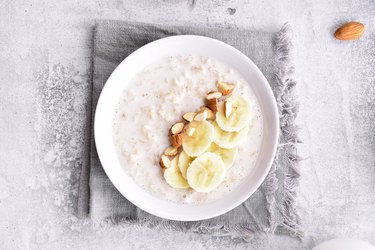
It's a perennial breakfast debate: grits or oatmeal? Both of these whole grains can be part of a balanced breakfast, but which one should you reach for in the morning? The answer depends on the types of health benefits you want.
Grits are a whole grain form of corn made into a porridge. This hearty food is particularly common in the Southern region of the country, where it has been part of Native American culture for centuries and is even the official prepared food of Georgia. It is often eaten as a breakfast food, though you can incorporate it into other meals as well.
Video of the Day
Video of the Day
Oatmeal is another type of whole grain that many people choose as a breakfast food. Both grits and oatmeal offer unique health benefits as part of a balanced diet. Be sure to review the nutrient content, health benefits and potential drawbacks of each.
Tip
While oatmeal is great for your heart, some versions have too much sugar. Grits can give you an antioxidant boost.
Benefits of Grits vs. Oatmeal
The serving sizes for oats and grits vary depending on the specific variety you choose and how you prepare them. Therefore, it's best to use weight when comparing the nutritional value of both grains. The U.S. Department of Agriculture (USDA) reports that there are 375 calories in 100 grams of rolled oats and 371 calories in the same amount of yellow grits. When it comes to calorie counting, you can eat oatmeal or grits for weight loss.
However, there's more to the grits vs. oatmeal debate than just calorie count. Oatmeal is higher in both fiber and protein than grits. However, grits have more micronutrients like potassium, calcium and vitamin A. Furthermore, each choice offers unique health benefits to consider.
According to the Harvard T.H. Chan School of Public Health, oats may:
- Help patients with heart disease
- Reduce blood sugar and insulin spikes in people with diabetes
- Ease digestive troubles
The main health benefits of eating grits revolve around the food's high antioxidant content. A study published in the May 2015 issue of the Journal of Liquid Chromatography & Related Technologies found that even though corn goes through a high-temperature extrusion process to become grits, it retains its antioxidant properties.
Antioxidants are thought to have several health benefits. Most notably, the National Cancer Institute states that antioxidants may prevent some of the damage from free radicals. These free radicals are often associated with cancer development.
Consider the Effect of Additives
While there are plenty of benefits of eating grits and oatmeal, there may be some drawbacks, depending on the way you prepare these foods. For example, instant oatmeal packs often contain added sugar. In fact, sugar can be the second ingredient in these packages.
While it can be difficult to avoid all added sugars, too much of this ingredient can cause serious health consequences. Harvard Health reports that a diet high in added sugar can increase your risk of cardiovascular disease. Added sugar may also:
- Be addictive
- Increase the risk for cancer
- Cause weight gain
- Harm the liver
- Hurt your teeth
If you want to include oatmeal in your daily routine, be sure to sweeten it with fruit or other natural sweeteners.
In most cases, grits are not prepared with added sugar. However, people often add butter to this breakfast choice. Butter isn't as bad as it once was thought to be. However, you may want to keep track of how much you consume.
The USDA reports that salted butter has 100 calories in just 1 tablespoon, so keep that in mind if you eat grits for weight loss. Furthermore, the American Heart Association recommends getting only about 5 to 6 percent of your calories from saturated fats like butter.
- Georgia Secretary of State: "State Prepared Food"
- American Heart Association: "Types of Whole Grains"
- USDA: "Oats"
- USDA: "Cereals, Corn Grits, Yellow, Regular and Quick, Unenriched, Dry"
- Harvard T.H. Chan School of Public Health: "Oats"
- Journal of Liquid Chromatography & Related Technologies: "Radical Scavenging Activity of Instant Grits with Addition of Chamomile Flowers Determined by TLC–DPPH Test and by Spectrophotometric Method"
- National Cancer Institute: "Antioxidants and Cancer Prevention"
- Harvard T.H. Chan School of Public Health: "Antioxidants: Beyond the Hype"
- USDA: "Instant Oatmeal"
- Harvard Health: "The Sweet Danger of Sugar"
- Cleveland Clinic: "Your Diet and Heart Disease: Rethinking Butter, Beef and Bacon"
- USDA: "Butter"
- American Heart Association: "Saturated Fat"